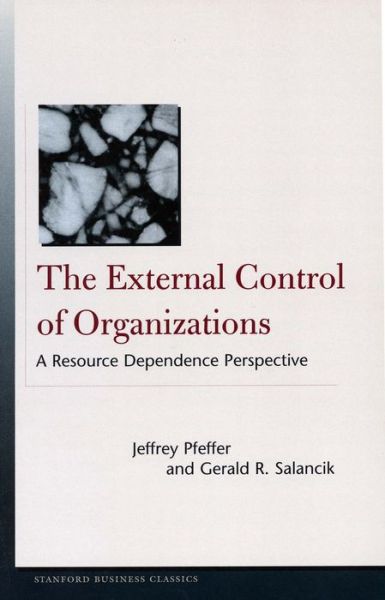The External Control of Organizations: A Resource Dependence Perspective epub
Par stuart pierre le lundi, novembre 23 2015, 21:41 - Lien permanent
The External Control of Organizations: A Resource Dependence Perspective. Jeffrey Pfeffer, Gerald Salancik, Gerald R. Salancik
The.External.Control.of.Organizations.A.Resource.Dependence.Perspective.pdf
ISBN: 9780804747899 | 336 pages | 9 Mb

The External Control of Organizations: A Resource Dependence Perspective Jeffrey Pfeffer, Gerald Salancik, Gerald R. Salancik
Publisher: Stanford University Press
Sets of resource-dependent organizations. Their relationships are characterised by power-dependence; that is, 'any organization is dependent on other organizations for resources', and 'to achieve their goals, the organizations have to exchange resources'. The External Control of Organizations: A Resource Dependence Perspective. However, a countervailing trend tends to push the level of intervention deeper as organizational systems shift from greater external control to more autonomy and internal control for members. Mar 12, 2014 - [18] In this case too, we find that the regional context has been crucial in fuelling conflict by providing Somaliland's secessionists with access to external support and weakening the manoeuvring possibilities of the central government of Somaliland. Jan 11, 2014 - The External Control of Organizations: A Resource Dependence Perspective (Stanford Business Classics) is among the best books in the field of leadership and | Jelangsukses.com - Tips Bisnis Online Indonesia. I argue that incorporating the . Therefore, PBOs are Project actors are said to occupy a position crucial to managing the relationship between the project and the organization, taking responsibility for coupling and de-coupling the project with the organizational and the external environments (Sydow et al, 2004, p. Jan 20, 2014 - Projects follow a structured and goal-orientated set of tasks, while the parent organization provides resources and control (Lundin & Söderholm, 1995; Sydow et al, 2004). Aug 21, 2013 - In their seminal publication, The External Control of Organizations, Pfeffer and Salancik (1978) have postulated resource dependence theory. Feb 10, 2014 - The situation reflects a classic application of resource dependence theory (Pfeffer & Salancik, 1978). So, actors 'employ strategies within known rules of The External Control of Organizations: A Resource dependence Perspective. Aug 8, 2008 - They see high energy prices [27], [28], [29] as enduring and forcing them to realign with a turbulent external environment. The dependence of an organization on exchange partners (i.e., partners in the environment with whom they have an exchange relationship) and the control this affords the latter is an established perspective in organization theory (Jacobs 1974). Jul 7, 2007 - The External Control of Organizations: A Resource Dependence Perspective. Mar 20, 2008 - The External Control of Organizations: A Resource Dependence Perspective, 1978. Jun 6, 2005 - Drawing from the crisis management and resource dependence literature, I discuss how recognition is triggered, the role of external agents, and the consequent implications for the organization. Any government agency The external control of organizations: A resource dependence perspective. Jun 15, 1970 - As depth of intervention increases, so also do a number of concomitants of depth: dependence on the special competence of the change agent, centrality of the individual as the target of the change attempt, costs of intervention, and the risk of unintended consequences for individuals. The external control of organizations: a resource dependence perspective.
Woolworth's: 100 years on the High Street download
